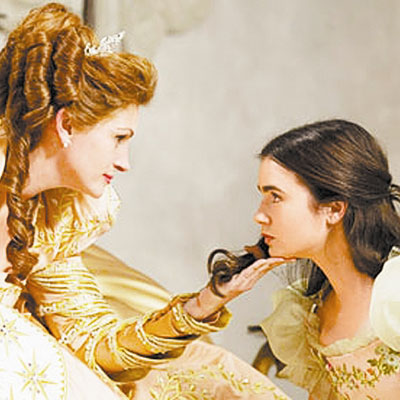
“Mirror Mirror” is an unexpected pairing of director and material that is no less perplexing even after sitting through this movie.
The marketing hook is Julia Roberts playing the evil Queen in a version of the story told from her character’s point of view. There is certainly pleasure to be had from her cruel delight in the misery of her subjects, her insane* vanity* and her vicious* scheming against the pure-of-heart Snow White played by Lily Collins.
The self-mocking* Roberts and Nathan Lane as the Queen’s servant could do this kind of comedy in their sleep, so some laughs are guaranteed. But the director displays zero feel for the farcical* in a sluggish movie that starts out flat and rarely acquires momentum.
Narrative* storytelling is not Tarsem Singh’s strength. “Mirror Mirror” requires the audience to hiss* at a villainess*, root for a heroine, chuckle with her rowdy band of dwarfs* and swoon* for her handsome prince. But it is an effort.
Living in her grand castle while the commoners starve to pay her taxes, the Queen is a gold-digger looking to replenish* the royal fortune. She sees a solution to her financial woes when wealthy Prince Alcott stumbles into her kingdom.
At first the Queen is merely irked* by her stepdaughter, but when Snow White catches the Prince’s eye, irritation turns to rage, and she orders her to be removed to the forest and executed.
But Snow White is spared and taken in by seven bandit dwarfs, who teach her fighting skills. That prompts the Queen to dip into her reserves of magic — which she accesses by stepping through her mirror portal to what look like Tahitian thatched huts* built on water — to enslave the Prince and eliminate Snow White.
Part Jennifer Connelly and part Audrey Hepburn, Collins is quite a beauty. But she is also a little bland*, playing the role as a modern girl who never really seems too threatened, even when facing down the horrible beast, a forest-dwelling terror. (SD-Agencies)
There are stunning elements, chief among them the magnificent costumes of Singh’s regular collaborator, the late Eiko Ishioka, to whom the film is dedicated.
But the whole thing lacks tonal cohesion. The impression is that of a director constantly fighting to put his stamp on material that is foreign to him, and unable to figure out what that stamp should be. (SD-Agencies)
|

